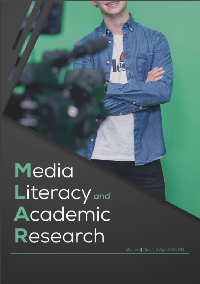Autobiography As A Genre Of Literary Remembering And Communication (And Its Presence In The Texts Of Albert Martiš)
Autobiography As A Genre Of Literary Remembering And Communication (And Its Presence In The Texts Of Albert Martiš)
Author(s): Patrik ŠenkárSubject(s): Language and Literature Studies, Communication studies, Ethnic Minorities Studies
Published by: Univerzita sv. Cyrila a Metoda v Trnave, Fakulta masmediálnej komunikácie
Keywords: Ethnic minority; Slovaks in Serbia (Vojvodina); Autobiography; Albert Martiš; Interpretation;
Summary/Abstract: The paper points out the importance of autobiography as a significant form of literary development. It is characterised by its main and typical features from the point of view of the most influential cultural thinkers. It expresses the general meaning of (chosen) individuality in the background of contemporary context and versatile (determined, diverse) contacts. Bysuch an object, it comes to the axiom that it is a kind of (re) presentation of the world, the period, creative people and their efforts in the cultural, literary, prosaic field. After general observations, the paper deals with the Kulpín native Albert Martiš (1855 - 1918), a prominent figure among the Slovaks in Serbia; then a resident, citizen, teacher, minority author within the Austro-Hungarian monarchy. It mentions the author's work, his memories of childhood and school years, but also his contemporary life. Based on this, it also reflects on unusual themes and portrayals of artistic material from the aspect of Martiš's short story-making. It analyses his versatile cultural-enlightening activity, with emphasis on his autobiographical features and short stories. This type of memoir literature presents Albert Martiš - according to literary criticism -from his best creative side. At the same time, the article interprets, from an objective-subjective point of view, his commemorative prose with autobiographical elements entitled Memories of the Lower Land Revival. Based on the documentary character of this work, the text analyses surroundings, social situations and prominent cultural and literary “workers” of the time. With special regard, it emphasizes the life and work of Albert Martiš, his gradual confirmation of education, morality and character, of course, in the background of the examined prototexts. The paper points out the most typical features of this segment of his literary work in the mentioned short stories, in which their specific diversity (even characteristic) is particularly interesting.The interpretation method from the position of perceptive reading presents various (concrete)elements of autobiography, which not only derive the typical features of Albert Martiš´s author idiolect, but also the overall social "atmosphere" of the Lowland in the late 19th and early 20thcenturies. In this way, the individual and collective memory of the past is being concretised at present, thanks to the interpreted prose, which is in fact a kind of media in various contexts of the cultural-literary tradition of all of us (also in the future)
Journal: Media Literacy and Academic Research
- Issue Year: 3/2020
- Issue No: 1
- Page Range: 97-112
- Page Count: 16
- Language: English

